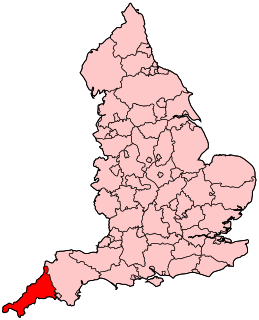
Devon, also known as Devonshire, which was formerly its common and official name, is a county of England, reaching from the Bristol Channel in the north to the English Channel in the south. It is part of South West England, bounded by Cornwall to the west, Somerset to the north east, and Dorset to the east. The city of Exeter is the county town. The county includes the districts of East Devon, Mid Devon, North Devon, South Hams, Teignbridge, Torridge, and West Devon. Plymouth and Torbay are each geographically part of Devon, but are administered as unitary authorities. Combined as a ceremonial county, Devon's area is 6,707 km2 and its population is about 1.1 million.

Newquay is a town in the south west of England, in the United Kingdom. It is a civil parish, seaside resort, regional centre for aerospace industries, future spaceport and a fishing port on the North Atlantic coast of Cornwall, approximately 12 miles (19 km) north of Truro and 20 miles (32 km) west of Bodmin.
A bardic name is a pseudonym used in Wales, Cornwall or Brittany by poets and other artists, especially those involved in the eisteddfod movement.

St Ives is a seaside town, civil parish and port in Cornwall. The town lies north of Penzance and west of Camborne on the coast of the Celtic Sea. In former times it was commercially dependent on fishing. The decline in fishing, however, caused a shift in commercial emphasis, and the town is now primarily a popular seaside resort, notably achieving the title of Best UK Seaside Town from the British Travel Awards in both 2010 and 2011. St Ives was incorporated by Royal Charter in 1639. St Ives has become renowned for its number of artists. It was named best seaside town of 2007 by The Guardian newspaper. It should not be confused with St Ive, a village and civil parish in south-east Cornwall.

Camborne is a town in Cornwall, England. The population at the 2011 Census was 20,845. The northern edge of the parish includes a section of the South West Coast Path, Hell's Mouth and Deadman's Cove.
Antony is a masculine given name and a surname which may refer to:
Trelawney (/treh-LAW-nee/) is a habitational surname surname of Cornish origin, meaning "a person from a town with a church". It may also be spelled Trelawn, Trelawne, and Trelawny.

St Columb Major is a town and civil parish in Cornwall, England, United Kingdom. Often referred to locally as St Columb, it is approximately seven miles (11 km) southwest of Wadebridge and six miles (10 km) east of Newquay
The designation Major distinguishes it from the nearby settlement and parish of St Columb Minor on the coast. An electoral ward simply named St Columb exists with a population at the 2011 census of 5,050.

Constantine is a village and civil parish in Cornwall, England, United Kingdom. It is situated approximately five miles (8 km) west-southwest of Falmouth. The electoral ward also bears the same name but includes Budock Water and the surrounding area. At the 2011 census, the population of the ward was 4,709 and the population of the civil parish was 1,789. The parish of Constantine is bounded by the parishes of Mabe, Mawnan, Gweek, Wendron and the north bank of the Helford River.
Butt is a German and an English surname whose origins lie in the South West peninsula region of England.
James Nathan is a barrister best known as the winner of the BBC's MasterChef 2008, having beaten Emily Ludolf and Jonny Stevenson in the grand final.. He was educated at Millfield in Somerset.
Cornish surnames are surnames used by Cornish people and often derived from the Cornish language such as Jago, Trelawney or Enys. Others have strong roots in the region and many in the UK with names such as Eddy, Stark or Rowe are likely to have Cornish origins. Such surnames for the common people emerged in the Middle Ages, although the nobility probably had surnames much earlier on. Not until the later Middle Ages did it become necessary for a common man to have a surname. Most surnames were fully established throughout Cornwall by the end of the 15th century. Today Cornish surnames can be found throughout the world as part of the Cornish diaspora.

John Keigwin (1641–1716) was a Cornish antiquary, born at Mousehole, Cornwall. He was a leading member of a group of antiquaries in west Penwith: this group also included John and Thomas Boson, William Gwavas, Thomas Tonkin, William Borlase, Oliver Pender, and James Jenkins of Alverton. His teacher was John Boson. In addition to Cornish and English, Keigwin had a command of the French, Latin, Greek and Hebrew languages.
Maker or Makers may refer to:

The following outline is provided as an overview of and topical guide to Cornwall:
Cornwall – ceremonial county and unitary authority area of England within the United Kingdom. Cornwall is a peninsula bordered to the north and west by the Celtic Sea, to the south by the English Channel, and to the east by the county of Devon, over the River Tamar. Cornwall is also a royal duchy of the United Kingdom. It has an estimated population of half a million and it has its own distinctive history and culture.
Erisey was a manor on the Lizard Peninsula, Cornwall, UK and is the surname of the family that built the house. The manor was originally in the civil parish of Grade and since 1934 Grade-Ruan. The Grade II listed building was built by Richard Eirsey in the 17th-century and in the 18th-century was owned by the Boscawan family of Tregothnan.
Presented below is an alphabetical index of articles related to Cornwall:









